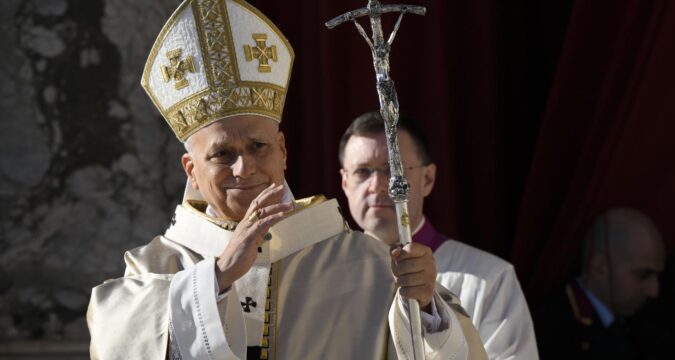
VATICAN (CNS): When Christians recite the Creed, it should prompt an examination of conscience about what they truly believe and what kind of example of faith in God they give to others, Pope Leo XIV wrote in his apostolic letter, In Unitate Fidei [In the Unity of Faith]. Published on November 23, it marked the 1,700th anniversary of the Council of Nicaea and its Creed.
He said he wanted it released in anticipation of his November 27-30 visit to Turkey to celebrate the anniversary of the Creed Christians share with Orthodox and Protestant leaders.
“Wars have been fought, and people have been killed, persecuted and discriminated against in the name of God,” the pope wrote. “Instead of proclaiming a merciful God, a vengeful God has been presented who instills terror and punishes.”
The bishops who had gathered in Nicaea in 325 had survived anti-Christian persecution, the pope said, but were facing the fracturing of their communities over disputes regarding “the essence of the Christian faith, namely the answer to the decisive question that Jesus had asked his disciples at Caesarea Philippi: ‘Who do you say that I am?’”
The pope explained, “Arius, a priest from Alexandria in Egypt, taught that Jesus was not truly the Son of God.” Arius taught that “though more than a mere creature,” Jesus was “an intermediate being between the inaccessible God and humanity. Moreover, there would have been a time when the Son ‘did not exist.’”
Wars have been fought, and people have been killed, persecuted and discriminated against in the name of God. Instead of proclaiming a merciful God, a vengeful God has been presented who instills terror and punishes
Pope Leo
The challenge facing the bishops, he said, was to affirm their faith in one God while making it clear that, as the creed now says, Jesus is “the Only Begotten Son of God, born of the Father before all ages … true God from true God, begotten, not made, consubstantial with the Father.”
The pope said that the bishops knew “no mortal being can, in fact, defeat death and save us; only God can do so. He has freed us through his Son made man, so that we might be free.”
In affirming monotheism and the true humanity and divinity of Christ, the pope said, “they wanted to reaffirm that the one true God is not inaccessibly distant from us, but on the contrary has drawn near and has come to encounter us in Jesus Christ.”
Pope Leo wrote, “This is the heart of our Christian life. For this reason, we commit to follow Jesus as our master, companion, brother and friend.”
The version of the Creed recited by most Catholics at Mass each Sunday and shared with other mainline Christians is formally called the Nicene-Constantinopolitan Creed, because it includes an article of faith inserted by the bishops at the First Council of Constantinople in 381 about the Holy Spirit.
…they [the Council of Nicaea] wanted to reaffirm that the one true God is not inaccessibly distant from us, but on the contrary has drawn near and has come to encounter us in Jesus Christ
A footnote in the pope’s letter noted that the phrase known as the “filioque”—and proceeds from the Father and the Son—”is not found in the text of Constantinople; it was inserted into the Latin Creed by Pope Benedict VIII in 1014 and is a subject of Orthodox-Catholic dialogue.”
Recent popes, including Pope Benedict XVI, Pope Francis and Pope Leo, have omitted the phrase at ecumenical prayer services.
In his letter, Pope Leo affirmed the Catholic Church’s commitment to the search for Christian unity and said, “The Nicene Creed can be the basis and reference point for this journey.” And he prayed that the Holy Spirit would come to all Christians “to revive our faith, to enkindle us with hope, to inflame us with charity.”
Pope Leo wrote, “The Nicene Creed does not depict a distant, inaccessible and immovable God who rests in himself, but a God who is close to us and accompanies us on our journey in the world, even in the darkest places on earth.”
He said that reciting the Creed, should prompt Christians to “examine our conscience.”
The Nicene Creed does not depict a distant, inaccessible and immovable God who rests in himself, but a God who is close to us and accompanies us on our journey in the world, even in the darkest places on earth
Pope Leo
The questions they should ask, he wrote, include: “What does God mean to me and how do I bear witness to my faith in him? Is the one and only God truly the Lord of my life, or do I have idols that I place before God and his commandments? Is God for me the living God, close to me in every situation, the Father to whom I turn with filial trust?”
He continued with more questions: “Is he the Creator to whom I owe everything I am and have, whose mark I can find in every creature? Am I willing to share the goods of the earth, which belong to everyone, in a just and equitable manner? How do I treat creation, the work of his hands? Do I exploit and destroy it, or do I use it with reverence and gratitude, caring for and cultivating it as the common home of humanity?”
Believing that God became human in Jesus means “that we now encounter the Lord in our brothers and sisters in need,” the pope said. That is why Jesus said, “As you did it to one of the least of these brothers and sisters of mine, you did it to me.”
Pope Leo wrote that the Creed “does not formulate a philosophical theory. It professes faith in the God who redeemed us through Jesus Christ. It is about the living God who wants us to have life and to have it in abundance.”








